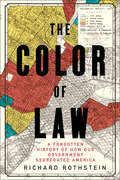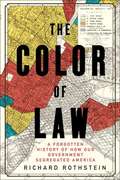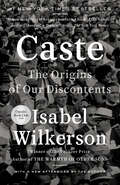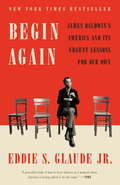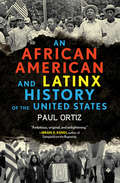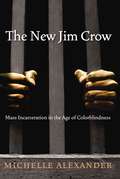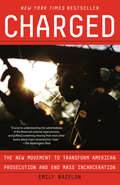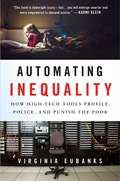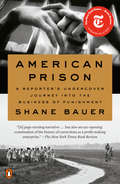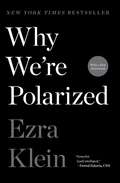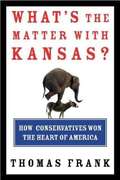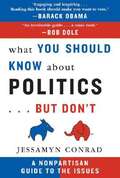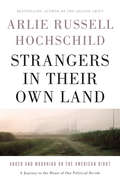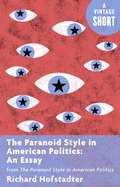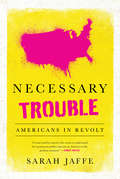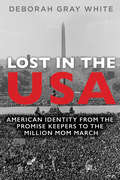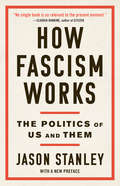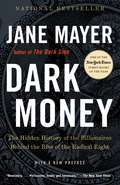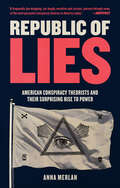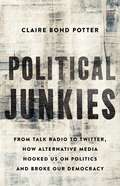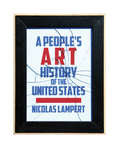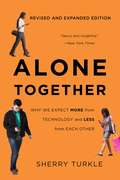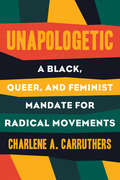Special Collections
NYPL's 2020 Election Reading List
Description: The books on this list cover voting issues including healthcare, education, climate change, and foreign policy, and explore subjects including political polarization, the media, and movements toward greater justice and equity.
- Table View
- List View
The Color of Law
by Richard RothsteinWidely heralded as a “masterful” (Washington Post) and “essential” (Slate) history of the modern American metropolis, Richard Rothstein’s The Color of Law offers “the most forceful argument ever published on how federal, state, and local governments gave rise to and reinforced neighborhood segregation” (William Julius Wilson).
Exploding the myth of de facto segregation arising from private prejudice or the unintended consequences of economic forces, Rothstein describes how the American government systematically imposed residential segregation: with undisguised racial zoning; public housing that purposefully segregated previously mixed communities; subsidies for builders to create whites-only suburbs; tax exemptions for institutions that enforced segregation; and support for violent resistance to African Americans in white neighborhoods.
A groundbreaking, “virtually indispensable” study that has already transformed our understanding of twentieth-century urban history (Chicago Daily Observer), The Color of Law forces us to face the obligation to remedy our unconstitutional past.
A New York Times Bestseller
The Color Of Law
by Richard RothsteinIn this groundbreaking history of the modern American metropolis, Richard Rothstein, a leading authority on housing policy, explodes the myth that America's cities came to be racially divided through de facto segregation--that is, through individual prejudices, income differences, or the actions of private institutions like banks and real estate agencies. Rather, The Color of Law incontrovertibly makes clear that it was de jure segregation--the laws and policy decisions passed by local, state, and federal governments--that actually promoted the discriminatory patterns that continue to this day. Through extraordinary revelations and extensive research that Ta-Nehisi Coates has lauded as "brilliant" (The Atlantic), Rothstein comes to chronicle nothing less than an untold story that begins in the 1920s, showing how this process of de jure segregation began with explicit racial zoning, as millions of African Americans moved in a great historical migration from the south to the north. As Jane Jacobs established in her classic The Death and Life of Great American Cities, it was the deeply flawed urban planning of the 1950s that created many of the impoverished neighborhoods we know. Now, Rothstein expands our understanding of this history, showing how government policies led to the creation of officially segregated public housing and the demolition of previously integrated neighborhoods. While urban areas rapidly deteriorated, the great American suburbanization of the post-World War II years was spurred on by federal subsidies for builders on the condition that no homes be sold to African Americans. Finally, Rothstein shows how police and prosecutors brutally upheld these standards by supporting violent resistance to black families in white neighborhoods. The Fair Housing Act of 1968 prohibited future discrimination but did nothing to reverse residential patterns that had become deeply embedded. Yet recent outbursts of violence in cities like Baltimore, Ferguson, and Minneapolis show us precisely how the legacy of these earlier eras contributes to persistent racial unrest. "The American landscape will never look the same to readers of this important book" (Sherrilyn Ifill, president of the NAACP Legal Defense Fund), as Rothstein's invaluable examination shows that only by relearning this history can we finally pave the way for the nation to remedy its unconstitutional past.
Citizen
by Claudia RankineA provocative meditation on race, Claudia Rankine’s long-awaited follow up to her groundbreaking book Don’t Let Me Be Lonely: An American Lyric
Claudia Rankine’s bold new book recounts mounting racial aggressions in ongoing encounters in twenty-first-century daily life and in the media. Some of these encounters are slights, seeming slips of the tongue, and some are intentional offensives in the classroom, at the supermarket, at home, on the tennis court with Serena Williams and the soccer field with Zinedine Zidane, online, on TV—everywhere, all the time. The accumulative stresses come to bear on a person’s ability to speak, perform, and stay alive. Our addressability is tied to the state of our belonging, Rankine argues, as are our assumptions and expectations of citizenship. In essay, image, and poetry, Citizen is a powerful testament to the individual and collective effects of racism in our contemporary, often named “post-race” society.
Caste
by Isabel WilkersonIn this brilliant book, Isabel Wilkerson gives us a masterful portrait of an unseen phenomenon in America as she explores, through an immersive, deeply researched narrative and stories about real people, how America today and throughout its history has been shaped by a hidden caste system, a rigid hierarchy of human rankings.
Beyond race, class, or other factors, there is a powerful caste system that influences people’s lives and behavior and the nation’s fate. Linking the caste systems of America, India, and Nazi Germany, Wilkerson explores eight pillars that underlie caste systems across civilizations, including divine will, bloodlines, stigma, and more. Using riveting stories about people—including Martin Luther King, Jr., baseball’s Satchel Paige, a single father and his toddler son, Wilkerson herself, and many others—she shows the ways that the insidious undertow of caste is experienced every day. She documents how the Nazis studied the racial systems in America to plan their out-cast of the Jews; she discusses why the cruel logic of caste requires that there be a bottom rung for those in the middle to measure themselves against; she writes about the surprising health costs of caste, in depression and life expectancy, and the effects of this hierarchy on our culture and politics. Finally, she points forward to ways America can move beyond the artificial and destructive separations of human divisions, toward hope in our common humanity.
Beautifully written, original, and revealing, Caste: The Origins of Our Discontents is an eye-opening story of people and history, and a reexamination of what lies under the surface of ordinary lives and of American life today.
A New York Times bestseller
Begin Again
by Eddie S. GlaudeJames Baldwin grew disillusioned by the failure of the civil rights movement to force America to confront its lies about race. In our own moment, when that confrontation feels more urgently needed than ever, what can we learn from his struggle?
We live, according to Eddie S. Glaude Jr., in a moment when the struggles of Black Lives Matter and the attempt to achieve a new America have been challenged by the election of Donald Trump, a president whose victory represents yet another failure of America to face the lies it tells itself about race. From Charlottesville to the policies of child separation at the border, his administration turned its back on the promise of Obama’s presidency and refused to embrace a vision of the country shorn of the insidious belief that white people matter more than others.
We have been here before: For James Baldwin, these after times came in the wake of the civil rights movement, when a similar attempt to compel a national confrontation with the truth was answered with the murders of Medgar Evers, Malcolm X, and Martin Luther King, Jr. In these years, spanning from the publication of The Fire Next Time in 1963 to that of No Name in the Street in 1972, Baldwin transformed into a more overtly political writer, a change that came at great professional and personal cost. But from that journey, Baldwin emerged with a sense of renewed purpose about the necessity of pushing forward in the face of disillusionment and despair.
In the story of Baldwin’s crucible, Glaude suggests, we can find hope and guidance through our own after times, this Trumpian era of shattered promises and white retrenchment. Mixing biography—drawn partially from newly uncovered interviews—with history, memoir, and trenchant analysis of our current moment, Begin Again is Glaude&’s endeavor, following Baldwin, to bear witness to the difficult truth of race in America today. It is at once a searing exploration that lays bare the tangled web of race, trauma, and memory, and a powerful interrogation of what we all must ask of ourselves in order to call forth a new America.
A New York Times Bestseller
An African American and Latinx History of the United States
by Paul OrtizAn intersectional history of the shared struggle for African American and Latinx civil rightsSpanning more than two hundred years, An African American and Latinx History of the United States is a revolutionary, politically charged narrative history arguing that the “Global South” was crucial to the development of America as we know it. Ortiz challenges the notion of westward progress, as exalted by widely taught formulations such as “manifest destiny” and “Jacksonian democracy,” and shows how placing African American, Latinx, and Indigenous voices unapologetically front and center transforms American history into the story of the working class organizing against imperialism.In precise detail, Ortiz traces this untold history from the Jim Crow-esque racial segregation of the Southwest, the rise and violent fall of a powerful tradition of Mexican labor organizing in the twentieth century, to May 1, 2006, International Workers’ Day, when migrant laborers—Chicana/os, Afro-Cubanos, and immigrants from nearly every continent on earth—united in resistance on the first “Day Without Immigrants.”Incisive and timely, An African American and Latinx History of the United States is a bottom-up history told from the viewpoint of African American and Latinx activists and revealing the radically different ways people of the diaspora addressed issues still plaguing the United States today.
The New Jim Crow
by Michelle AlexanderAs the United States celebrates the nation's "triumph over race" with the election of Barack Obama, the majority of young black men in major American cities are locked behind bars or have been labeled felons for life. Although Jim Crow laws have been wiped off the books, an astounding percentage of the African American community remains trapped in a subordinate status--much like their grandparents before them.In this incisive critique, former litigator-turned-legal-scholar Michelle Alexander provocatively argues that we have not ended racial caste in America: we have simply redesigned it. Alexander shows that, by targeting black men and decimating communities of color, the U.S. criminal justice system functions as a contemporary system of racial control, even as it formally adheres to the principle of color blindness. The New Jim Crow challenges the civil rights community--and all of us--to place mass incarceration at the forefront of a new movement for racial justice in America.
From the War on Poverty to the War on Crime
by Elizabeth HintonHow did the land of the free become the home of the world's largest prison system? Elizabeth Hinton traces the rise of mass incarceration to an ironic source: not the War on Drugs of the Reagan administration but the War on Crime that began during Johnson's Great Society at the height of the civil rights era.
Charged
by Emily BazelonA renowned journalist and legal commentator exposes the unchecked power of the prosecutor as a driving force in America’s mass incarceration crisis—and charts a way out.
The American criminal justice system is supposed to be a contest between two equal adversaries, the prosecution and the defense, with judges ensuring a fair fight.
That image of the law does not match the reality in the courtroom, however. Much of the time, it is prosecutors more than judges who control the outcome of a case, from choosing the charge to setting bail to determining the plea bargain. They often decide who goes free and who goes to prison, even who lives and who dies.
In Charged, Emily Bazelon reveals how this kind of unchecked power is the underreported cause of enormous injustice—and the missing piece in the mass incarceration puzzle.
Charged follows the story of two young people caught up in the criminal justice system: Kevin, a twenty-year-old in Brooklyn who picked up his friend’s gun as the cops burst in and was charged with a serious violent felony, and Noura, a teenage girl in Memphis indicted for the murder of her mother.
Bazelon tracks both cases—from arrest and charging to trial and sentencing—and, with her trademark blend of deeply reported narrative, legal analysis, and investigative journalism, illustrates just how criminal prosecutions can go wrong and, more important, why they don’t have to.
Bazelon also details the second chances they prosecutors can extend, if they choose, to Kevin and Noura and so many others.
She follows a wave of reform-minded D.A.s who have been elected in some of our biggest cities, as well as in rural areas in every region of the country, put in office to do nothing less than reinvent how their job is done. If they succeed, they can point the country toward a different and profoundly better future.
A New York Times Bestseller
Automating Inequality
by Virginia EubanksThe State of Indiana denies one million applications for healthcare, foodstamps and cash benefits in three years—because a new computer system interprets any mistake as “failure to cooperate.” In Los Angeles, an algorithm calculates the comparative vulnerability of tens of thousands of homeless people in order to prioritize them for an inadequate pool of housing resources. In Pittsburgh, a child welfare agency uses a statistical model to try to predict which children might be future victims of abuse or neglect.
Since the dawn of the digital age, decision-making in finance, employment, politics, health and human services has undergone revolutionary change. Today, automated systems—rather than humans—control which neighborhoods get policed, which families attain needed resources, and who is investigated for fraud. While we all live under this new regime of data, the most invasive and punitive systems are aimed at the poor.
In Automating Inequality, Virginia Eubanks systematically investigates the impacts of data mining, policy algorithms, and predictive risk models on poor and working-class people in America. The book is full of heart-wrenching and eye-opening stories, from a woman in Indiana whose benefits are literally cut off as she lays dying to a family in Pennsylvania in daily fear of losing their daughter because they fit a certain statistical profile.
The U.S. has always used its most cutting-edge science and technology to contain, investigate, discipline and punish the destitute. Like the county poorhouse and scientific charity before them, digital tracking and automated decision-making hide poverty from the middle-class public and give the nation the ethical distance it needs to make inhumane choices: which families get food and which starve, who has housing and who remains homeless, and which families are broken up by the state. In the process, they weaken democracy and betray our most cherished national values.
This deeply researched and passionate book could not be more timely.
American Prison
by Shane BauerA ground-breaking and brave inside reckoning with the nexus of prison and profit in America: in one Louisiana prison and over the course of our country's history.
In 2014, Shane Bauer was hired for $9 an hour to work as an entry-level prison guard at a private prison in Winnfield, Louisiana. An award-winning investigative journalist, he used his real name; there was no meaningful background check. Four months later, his employment came to an abrupt end. But he had seen enough, and in short order he wrote an exposé about his experiences that won a National Magazine Award and became the most-read feature in the history of the magazine Mother Jones. Still, there was much more that he needed to say.
In American Prison, Bauer weaves a much deeper reckoning with his experiences together with a thoroughly researched history of for-profit prisons in America from their origins in the decades before the Civil War. For, as he soon realized, we can't understand the cruelty of our current system and its place in the larger story of mass incarceration without understanding where it came from. Private prisons became entrenched in the South as part of a systemic effort to keep the African-American labor force in place in the aftermath of slavery, and the echoes of these shameful origins are with us still.
The private prison system is deliberately unaccountable to public scrutiny. Private prisons are not incentivized to tend to the health of their inmates, or to feed them well, or to attract and retain a highly-trained prison staff. Though Bauer befriends some of his colleagues and sympathizes with their plight, the chronic dysfunction of their lives only adds to the prison's sense of chaos. To his horror, Bauer finds himself becoming crueler and more aggressive the longer he works in the prison, and he is far from alone.
A blistering indictment of the private prison system, and the powerful forces that drive it, American Prison is a necessary human document about the true face of justice in America.
Why We're Polarized
by Ezra KleinONE OF BARACK OBAMA&’S FAVORITE BOOKS OF 2022 One of Bill Gates&’s &“5 books to read this summer,&” this New York Times and Wall Street Journal bestseller shows us that America&’s political system isn&’t broken. The truth is scarier: it&’s working exactly as designed. In this &“superbly researched&” (The Washington Post) and timely book, journalist Ezra Klein reveals how that system is polarizing us—and how we are polarizing it—with disastrous results.&“The American political system—which includes everyone from voters to journalists to the president—is full of rational actors making rational decisions given the incentives they face,&” writes political analyst Ezra Klein. &“We are a collection of functional parts whose efforts combine into a dysfunctional whole.&” &“A thoughtful, clear and persuasive analysis&” (The New York Times Book Review), Why We&’re Polarized reveals the structural and psychological forces behind America&’s descent into division and dysfunction. Neither a polemic nor a lament, this book offers a clear framework for understanding everything from Trump&’s rise to the Democratic Party&’s leftward shift to the politicization of everyday culture. America is polarized, first and foremost, by identity. Everyone engaged in American politics is engaged, at some level, in identity politics. Over the past fifty years in America, our partisan identities have merged with our racial, religious, geographic, ideological, and cultural identities. These merged identities have attained a weight that is breaking much in our politics and tearing at the bonds that hold this country together. Klein shows how and why American politics polarized around identity in the 20th century, and what that polarization did to the way we see the world and one another. And he traces the feedback loops between polarized political identities and polarized political institutions that are driving our system toward crisis. &“Well worth reading&” (New York magazine), this is an &“eye-opening&” (O, The Oprah Magazine) book that will change how you look at politics—and perhaps at yourself.
What You Should Know about Politics... But Don't
by Jessamyn ConradThe author presents a voter's guide to the major national issues and debates being contested within mainstream two-party politics in the United States. She offers chapters on elections, the economy, foreign policy, the military, health care, energy, the environment, civil liberties, culture wars, socioeconomic policy, homeland security, education, and trade. Each chapter provides brief background before attending to current debates. Breadth of coverage is emphasized over depth and, with the exception of some footnotes, no guides to further reading are provided. Annotation ©2008 Book News, Inc., Portland, OR (booknews.com)
Strangers in Their Own Land
by Arlie Russell HochschildIn Strangers in Their Own Land, the renowned sociologist Arlie Hochschild embarks on a thought-provoking journey from her liberal hometown of Berkeley, California, deep into Louisiana bayou country--a stronghold of the conservative right. As she gets to know people who strongly oppose many of the ideas she famously champions, Hochschild nevertheless finds common ground and quickly warms to the people she meets--among them a Tea Party activist whose town has been swallowed by a sinkhole caused by a drilling accident--people whose concerns are actually ones that all Americans share: the desire for community, the embrace of family, and hopes for their children.Strangers in Their Own Land goes beyond the commonplace liberal idea that these are people who have been duped into voting against their own interests. Instead, Hochschild finds lives ripped apart by stagnant wages, a loss of home, an elusive American dream--and political choices and views that make sense in the context of their lives. Hochschild draws on her expert knowledge of the sociology of emotion to help us understand what it feels like to live in "red" America. Along the way she finds answers to one of the crucial questions of contemporary American politics: why do the people who would seem to benefit most from "liberal" government intervention abhor the very idea?
The Paranoid Style in American Politics
by Richard HofstadterA Vintage Shorts Selection A timely reissue of acclaimed historian Richard Hofstadter's authoritative and unforgettable essay. First published in 1964 and no less relevant half a century later, The Paranoid Style in American Politics scrutinizes the conditions that gave rise to the extreme right of the 1950s and the 1960s, and presages the ascendancy of the Tea Party movement and, now, Donald Trump's 2016 presidential campaign. Fringe groups can and do both influence and derail American politics, and Hofstadter remains indispensable reading for anyone who wants to understand why paranoia, a persistent psychic phenomenon with an outsize role in American public life, refuses to abate. An ebook short.
Necessary Trouble
by Sarah JaffeNecessary Trouble is the definitive book on the movements that are poised to permanently remake American politics. We are witnessing a moment of unprecedented political turmoil and social activism. Over the last few years, we've seen the growth of the Tea Party, a twenty-first-century black freedom struggle with BlackLivesMatter, Occupy Wall Street, and the grassroots networks supporting presidential candidates in defiance of the traditional party elites.Sarah Jaffe leads readers into the heart of these movements, explaining what has made ordinary Americans become activists. As Jaffe argues, the financial crisis in 2008 was the spark, the moment that crystallized that something was wrong. For years, Jaffe crisscrossed the country, asking people what they were angry about, and what they were doing to take power back. She attended a people's assembly in a church gymnasium in Ferguson, Missouri; walked a picket line at an Atlanta Burger King; rode a bus from New York to Ohio with student organizers; and went door-to-door in Queens days after Hurricane Sandy.From the successful fight for a 15 minimum wage in Seattle and New York to the halting of Shell's Arctic drilling program, Americans are discovering the effectiveness of making good, necessary trouble. Regardless of political alignment, they are boldly challenging who wields power in this country.
Lost in the USA
by Deborah Gray WhiteRemembered as an era of peace and prosperity, turn-of-the-millennium America was also a time of mass protest. But the political demands of the marchers seemed secondary to an urgent desire for renewal and restoration felt by people from all walks of life. Drawing on thousands of personal testimonies, Deborah Gray White explores how Americans sought better ways of living in, and dealing with, a rapidly changing world. From the Million Man, Million Woman, and Million Mom Marches to the Promise Keepers and LGBT protests, White reveals a people lost in their own country. Mass gatherings offered a chance to bond with like-minded others against a relentless tide of loneliness and isolation. By participating, individuals opened a door to self-discovery that energized their quests for order, autonomy, personal meaning, and fellowship in a society that seemed hostile to such deeper human needs. Moving forward in time, White also shows what marchers found out about themselves and those gathered around them. The result is an eye-opening reconsideration of a defining time in contemporary America.
How Fascism Works
by Jason Stanley“Reveals how the liberties of the people wither when voters embrace politicians who promote the divisive politics of us versus them.”—David Cay Johnston, author of The Making of Donald Trump and It’s Even Worse Than You Think“This is an important and essential book.”—Errol Morris, filmmaker and author of The AshtrayFascist politics are running rampant in America today—and spreading around the world. A Yale philosopher identifies the ten pillars of fascist politics, and charts their horrifying rise and deep history. As the child of refugees of World War II Europe and a renowned philosopher and scholar of propaganda, Jason Stanley has a deep understanding of how democratic societies can be vulnerable to fascism: Nations don’t have to be fascist to suffer from fascist politics. In fact, fascism’s roots have been present in the United States for more than a century. Alarmed by the pervasive rise of fascist tactics both at home and around the globe, Stanley focuses here on the structures that unite them, laying out and analyzing the ten pillars of fascist politics—the language and beliefs that separate people into an “us” and a “them.” He knits together reflections on history, philosophy, sociology, and critical race theory with stories from contemporary Hungary, Poland, India, Myanmar, and the United States, among other nations. He makes clear the immense danger of underestimating the cumulative power of these tactics, which include exploiting a mythic version of a nation’s past; propaganda that twists the language of democratic ideals against themselves; anti-intellectualism directed against universities and experts; law and order politics predicated on the assumption that members of minority groups are criminals; and fierce attacks on labor groups and welfare. These mechanisms all build on one another, creating and reinforcing divisions and shaping a society vulnerable to the appeals of authoritarian leadership. By uncovering disturbing patterns that are as prevalent today as ever, Stanley reveals that the stuff of politics—charged by rhetoric and myth—can quickly become policy and reality. Only by recognizing fascists politics, he argues, may we resist its most harmful effects and return to democratic ideals.“With unsettling insight and disturbing clarity, How Fascism Works is an essential guidebook to our current national dilemma of democracy vs. authoritarianism.”—William Jelani Cobb, author of The Substance of Hope
Dark Money
by Jane MayerNATIONAL BESTSELLERONE OF THE NEW YORK TIMES 10 BEST BOOKS OF THE YEARWho are the immensely wealthy right-wing ideologues shaping the fate of America today? From the bestselling author of The Dark Side, an electrifying work of investigative journalism that uncovers the agenda of this powerful group.In her new preface, Jane Mayer discusses the results of the most recent election and Donald Trump's victory, and how, despite much discussion to the contrary, this was a huge victory for the billionaires who have been pouring money in the American political system.Why is America living in an age of profound and widening economic inequality? Why have even modest attempts to address climate change been defeated again and again? Why do hedge-fund billionaires pay a far lower tax rate than middle-class workers? In a riveting and indelible feat of reporting, Jane Mayer illuminates the history of an elite cadre of plutocrats—headed by the Kochs, the Scaifes, the Olins, and the Bradleys—who have bankrolled a systematic plan to fundamentally alter the American political system. Mayer traces a byzantine trail of billions of dollars spent by the network, revealing a staggering conglomeration of think tanks, academic institutions, media groups, courthouses, and government allies that have fallen under their sphere of influence. Drawing from hundreds of exclusive interviews, as well as extensive scrutiny of public records, private papers, and court proceedings, Mayer provides vivid portraits of the secretive figures behind the new American oligarchy and a searing look at the carefully concealed agendas steering the nation. Dark Money is an essential book for anyone who cares about the future of American democracy.National Book Critics Circle Award FinalistLA Times Book Prize FinalistPEN/Jean Stein Book Award FinalistShortlisted for the Lukas Prize
Republic of Lies
by Anna Merlan“[An] engrossing assessment of the profitable mainstreaming of conspiracy mongering in civic and political life . . . A lucid look at a slippery topic.” —Kirkus ReviewsAmerican society has always been fertile ground for conspiracy theories, but with the election of Donald Trump, previously outlandish ideas suddenly attained legitimacy. Trump himself is a conspiracy enthusiast: From his claim that global warming is a Chinese hoax to the accusations of “fake news,” he has fanned the flames of suspicion.But it was not one man alone who gave these ideas increased power. Republic of Lies looks beyond the caricatures of conspiracy theorists to explain their tenacity. Without lending the theories validity, Anna Merlan gives a nuanced, sympathetic account of the people behind them, across the political spectrum, and the circumstances that helped them take hold. The lack of a social safety net, inadequate education, bitter culture wars, and years of economic insecurity have created large groups of people who feel forgotten by their government and even besieged by it. Our contemporary conditions are a perfect petri dish for conspiracy movements: a durable, permanent, elastic climate of alienation and resentment. All the while, an army of politicians and media figures have peddled fear to serve their own ends.Bringing together penetrating historical analysis and gripping on-the-ground reporting, Republic of Lies transforms our understanding of American paranoia.“A captivating book that illuminates the landscape of conspiracy theories and what they might say about society as a whole.” —New York Magazine
Political Junkies
by Claire Bond PotterA wide-ranging history of seventy years of change in political media, and how it transformed -- and fractured -- American politicsWith fake news on Facebook, trolls on Twitter, and viral outrage everywhere, it's easy to believe that the internet changed politics entirely. In Political Junkies, historian Claire Bond Potter shows otherwise, revealing the roots of today's dysfunction by situating online politics in a longer history of alternative political media. From independent newsletters in the 1950s to talk radio in the 1970s to cable television in the 1980s, pioneers on the left and right developed alternative media outlets that made politics more popular, and ultimately, more partisan. When campaign operatives took up e-mail, blogging, and social media, they only supercharged these trends. At a time when political engagement has never been greater and trust has never been lower, Political Junkies is essential reading for understanding how we got here.
A People's Art History of the United States
by Nicolas LampertMost people outside of the art world view art as something that is foreign to their experiences and everyday lives. A People's Art History of the United States places art history squarely in the rough-and-tumble of politics, social struggles, and the fight for justice from the colonial era through the present day.Author and radical artist Nicolas Lampert combines historical sweep with detailed examinations of individual artists and works in a politically charged narrative that spans the conquest of the Americas, the American Revolution, slavery and abolition, western expansion, the suffragette movement and feminism, civil rights movements, environmental movements, LGBT movements, antiglobalization movements, contemporary antiwar movements, and beyond.A People's Art History of the United States introduces us to key works of American radical art alongside dramatic retellings of the histories that inspired them. Stylishly illustrated with over two hundred images, this book is nothing less than an alternative education for anyone interested in the powerful role that art plays in our society.
Alone Together
by Sherry TurkleConsider Facebook—it’s human contact, only easier to engage with and easier to avoid. Developing technology promises closeness. Sometimes it delivers, but much of our modern life leaves us less connected with people and more connected to simulations of them.In Alone Together, MIT technology and society professor Sherry Turkle explores the power of our new tools and toys to dramatically alter our social lives. It’s a nuanced exploration of what we are looking for—and sacrificing—in a world of electronic companions and social networking tools, and an argument that, despite the hand-waving of today’s self-described prophets of the future, it will be the next generation who will chart the path between isolation and connectivity.
Unapologetic
by Charlene CarruthersA manifesto from one of America's most influential activists which disrupts political, economic, and social norms by reimagining the Black Radical Tradition.
Drawing on Black intellectual and grassroots organizing traditions, including the Haitian Revolution, the US civil rights movement, and LGBTQ rights and feminist movements, Unapologetic challenges all of us engaged in the social justice struggle to make the movement for Black liberation more radical, more queer, and more feminist. This book provides a vision for how social justice movements can become sharper and more effective through principled struggle, healing justice, and leadership development. It also offers a flexible model of what deeply effective organizing can be, anchored in the Chicago model of activism, which features long-term commitment, cultural sensitivity, creative strategizing, and multiple cross-group alliances. And Unapologetic provides a clear framework for activists committed to building transformative power, encouraging young people to see themselves as visionaries and leaders.
